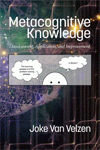
Metacognitive Knowledge
Development, Application, and Improvement
Published 2017
An important goal in contemporary educational psychology research is adolescent students’ development of higher‐order thinking, which includes, among other things, that these students become competent and independent learners and problem solvers. This goal comes forth from the notion of education for life that emphasizes that students can direct their learning and problem solving of their own accord. Especially high‐school students can encounter difficulties in independent learning and problem solving when they make the transition to higher education. To counter this, these students need to possess, among other things, metacognitive knowledge, which they may have insufficiently.
This book offers new insights about late adolescent students’ understanding of their metacognitive knowledge regarding learning and problem solving. It offers a description of a research project conducted to obtain a better understanding of the students’ abilities and views with respect to what their metacognitive knowledge encompasses, and how they attempt to develop, apply, and improve this knowledge regarding learning and the solving of mathematical and first‐language problems in a more effective way of their own accord. Specifically, the results of the studies of the research project enable us to understand metacognitive knowledge better, in that it provides explanations about the students’ development of this knowledge across domains. This book offers further details in terms of providing evidence for theory building regarding metacognitive knowledge.
CONTENTS
Preface. Introduction to Metacognitive Knowledge. The Research Project. Worthwhileness and Materials. Overview of Metacognitive Knowledge. Applying Metacognitive Knowledge: Effective Planning. Developing Metacognitive Knowledge: Self‐Induced Self‐Reflective Thinking. Improvement Techniques: Deliberate Practice and Hypothesis Testing. Synthesis. Instructional Implications in Constructing Metacognitive Knowledge: Can Inquiry‐Based Learning Provide for a Solution? Appendices: A General Method of the Research Project. B Research Report on the Mathematics Teachers Study. C Research Report on the Mathematics TPT‐I Study. D Research Report on the First‐Language Teachers Study. E Research Report on the First‐Language TPT‐I Study. F Research Report on the Pilot I and Pilot II Studies Regarding Learning. G Research Report on the First‐Language TPTII Study. H Research Report on the KMPP‐II Study. I Research Report on the KLPP‐I Study. J Research Report on the GKLP‐II Study. K Research Report on the Learning Plan and Learning Improvement Techniques Studies. L Research Report on the Mathematics Effective Planning Study Regarding the Mathematics TPT‐I Study. M Research Report on the First‐language Effective Planning Study. N The Scoring of SISRT for the U2‐Students and the U3‐Students. References. About the Author.
-
Paperback978-1-64113-022-6
Web price: $45.04 (Reg. 52.99)
-
Hardcover978-1-64113-023-3
Web price: $80.74 (Reg. 94.99)
- eBook978-1-64113-024-0

- PSY008000 - PSYCHOLOGY: Cognitive Psychology
- PSY002000 - PSYCHOLOGY: DEVELOPMENTAL: Adolescent
- EDU000000 - EDUCATION: General
-
 Distance Learning
Volume 20 #3
Distance Learning
Volume 20 #3
-
 Distance Learning
Volume 20 #4
Distance Learning
Volume 20 #4
-
 Distance Learning
Volume 19 #4
Distance Learning
Volume 19 #4
-
 Distance Learning
Volume 20 #1
Distance Learning
Volume 20 #1
-
 Lift Every Voice
Radford University Teacher Education Students
Lift Every Voice
Radford University Teacher Education Students
-
 Middle Grades Research Journal
Volume 13 #2
Middle Grades Research Journal
Volume 13 #2
-
 Rekindling Embers of the Soul
An Examination of Spirituality Issues Relating to Teacher Education
Rekindling Embers of the Soul
An Examination of Spirituality Issues Relating to Teacher Education

